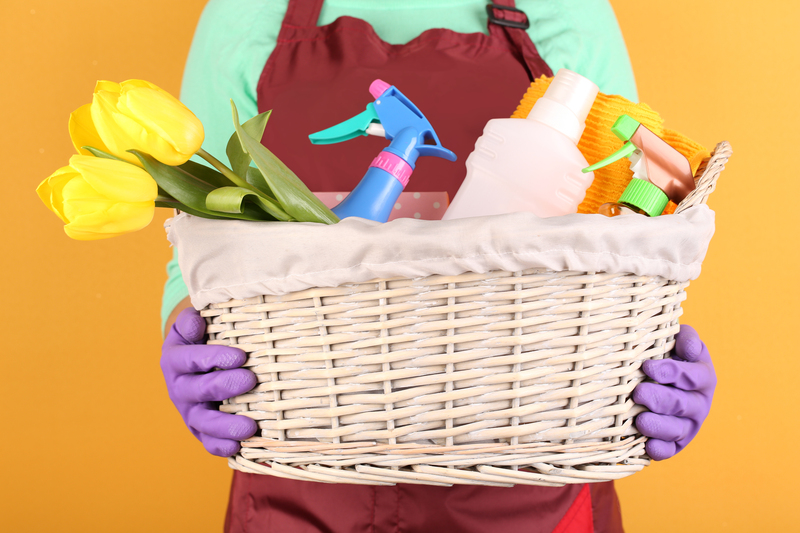Expert-Approved Techniques for Jewellery Cleaning Success
Posted on 23/06/2025
Expert-Approved Techniques for Jewellery Cleaning Success
Jewellery is not just a fashion statement--it's a cherished possession, an heirloom, and sometimes even a sentimental token. Over time, whether from daily wear or being left unused, jewellery can become dull, tarnished, or lose its sparkle. For enthusiasts, collectors, and anyone who treasures their adornments, understanding the best ways to clean and maintain jewellery is vital. In this comprehensive guide, we present expert-approved jewellery cleaning techniques that will help you keep your pieces looking stunning for years to come.

Why Expert Jewellery Cleaning Matters
A professional approach to jewellery cleaning is more than just about aesthetics. Here are several key benefits of applying expert-backed techniques:
- Preserves Value: Proper care prevents permanent damage and helps retain monetary and sentimental worth.
- Prevents Wear and Tear: Removing dirt and grime protects joints, clasps, and precious stones.
- Enhances Appearance: Well-maintained jewellery shines brighter and looks more impressive.
- Hygiene Factor: Gemstones and metal can harbor bacteria if not cleaned regularly, leading to skin issues.
By following time-tested methods, not only do you keep your jewellery sparkling, but you also extend its lifespan. Let's delve into the expert jewellery cleaning strategies for every type of piece in your collection.
Understanding the Materials: Why It Matters
The first step towards successful jewellery cleaning is to identify your jewellery's material. Different metals and gemstones require specific cleaning approaches to avoid accidental damage.
Common Jewellery Materials
- Gold (yellow, white, or rose)
- Silver
- Platinum
- Diamond
- Gemstones (sapphire, emerald, ruby, opal, etc.)
- Pearls
- Costume (fashion) jewellery
Knowing the composition is critical because methods appropriate for gold may damage pearls or silver. Always check if your jewellery is treated, plated, or set with delicate stones before proceeding.
General Best Practices for Jewellery Cleaning
Professional jewellers and experts recommend a set of universal principles for all jewellery cleaning routines:
- Avoid Harsh Chemicals: Bleach, ammonia, and other strong agents may erode metals and dull or damage stones.
- Gentle Tools: Use soft-bristled brushes, microfiber cloths, and non-abrasive materials for cleaning.
- Warm Water Over Hot: Extreme temperatures can crack gemstones or loosen settings.
- Take Extra Care with Settings: When cleaning, be gentle around prongs, bezels, or glue-set stones.
- Rinse Thoroughly: Ensure no soap or cleaner residue is left behind as it can attract more dirt.
- Dry Completely: Moisture may corrode or tarnish metals over time. Use a lint-free towel to pat dry.
Expert-Approved Jewellery Cleaning Techniques by Material
Gold Jewellery
Gold is relatively non-reactive, but it can become dull due to exposure to lotions, perfumes, and household chemicals. For best gold jewellery cleaning results, experts suggest:
- Mix a few drops of mild dish soap with warm (not hot) water.
- Soak your gold jewellery for around 15-20 minutes.
- Gently scrub using a soft toothbrush, especially in crevices.
- Rinse thoroughly in clean, warm water.
- Pat dry with a microfiber cloth.
Expert tip: Avoid using paper towels or tissues, as they may scratch the gold surface.
Silver Jewellery
Silver is prone to tarnishing, especially when exposed to air and moisture. To clean tarnished silver jewellery effectively:
- Use a silver polishing cloth for light tarnish.
- For heavier tarnish, create a paste with baking soda and water. Gently rub onto the jewellery with your finger or a soft cloth, then rinse well.
- Commercial silver cleaners can be used, but always follow the manufacturer's instructions.
Important: Avoid cleaning oxidized (blackened) silver this way, as these methods may remove its decorative finish.
Diamond and Precious Gemstones
Diamonds and hard gemstones like sapphires or rubies can handle regular, gentle cleaning. Here's what the experts recommend for sparkling diamond jewellery:
- Soak in warm, soapy water for 20-30 minutes.
- Use a soft brush to clean beneath the stones and around settings.
- Rinse under running water and inspect under light to ensure all dirt is removed.
For ultra-delicate or valuable pieces, professional ultrasonic cleaning is advised, but check first if your gemstone can withstand this process.
Pearls
Pearls are delicate due to their organic composition. The experts' protocol for pearl jewellery cleaning:
- Never soak pearls, as water can weaken the string and damage the nacre.
- Wipe with a soft, damp cloth after every wear.
- For a deeper clean, use a cloth dipped in a mixture of lukewarm water and mild soap, then wipe with a water-only cloth and dry immediately.
- Lay pearls flat to dry, never hang, to avoid stretching the silk thread.
Costume / Fashion Jewellery
Fashion jewellery with base metals or glued stones requires special considerations:
- Do not soak. Use a barely damp cloth to wipe the surface.
- Avoid any cleaning solutions that can loosen adhesives or tarnish plated metals.
- Immediately dry with a soft cloth and store in a moisture-free environment.
Extra tip: For cleaning intricate fashion pieces, use a dry soft-bristle brush (like a makeup brush).
Advanced Jewellery Cleaning Methods Recommended by Experts
Ultrasonic Cleaners
An ultrasonic cleaner uses high-frequency sound waves to produce tiny bubbles that dislodge dirt from hard-to-reach areas. While effective, this cleaning method is best used for hard gemstones and robust pieces. Experts caution that:
- Pearls, opals, emeralds, or any stone with surface inclusions should not be placed in an ultrasonic cleaner.
- Inspect all settings and prongs carefully before and after cleaning, as the vibration may loosen stones.
- Always use the manufacturer's recommended solution and cleaning time.
Professional Steam Cleaning
Jewellery steam cleaning harnesses high-pressure steam to remove grime and sterilize pieces. This method is best performed by a professional jeweller. However, for those seeking at-home options, smaller steam cleaners are available, but should be used with great caution, especially on delicate settings.
Preventative Care: How to Keep Your Jewellery Clean Longer
The best expert jewellery cleaning tip is to prevent build-up in the first place! Here are preventive habits recommended by seasoned jewellers:
- Remove jewellery when swimming, exercising, or using household chemicals.
- Put jewellery on last: Lotions, perfumes, and hairspray can coat metals and stones.
- Regularly inspect settings and clasps for looseness or signs of wear.
- Store jewellery separately (preferably in soft pouches or lined boxes) to avoid scratches and tangling.
- Have valuable pieces professionally checked and cleaned annually.
Eco-Friendly and Homemade Jewellery Cleaning Solutions
If you prefer a sustainable approach, there are several eco-friendly jewellery cleaning options that experts have vetted:
- Baking soda paste (for silver): Mix three parts baking soda to one part water into a paste and gently apply.
- White vinegar soak (for tarnished silver): Soak pieces in a mixture of 1/2 cup white vinegar and 2 tablespoons baking soda for 2-3 hours, rinse and dry well.
- Soap nut (reetha) solution: Used traditionally in some cultures, a mild soap nut infusion can gently clean gold and gemstone jewellery.
Always test homemade solutions on a small, inconspicuous area first to ensure no adverse reactions.
Jewellery Cleaning Mistakes to Avoid
Even with the best intentions, improper cleaning can irreversibly harm your treasured items. According to jewellery professionals, these are the top mistakes to avoid:
- Using toothpaste: Although a popular DIY tip, toothpaste is abrasive and can scratch precious metals and stones.
- Applying bleach or chlorine: Both are corrosive and may damage or discolor metals.
- Mass cleaning different pieces together: Separate materials to avoid scratches or chemical reactions.
- Neglecting professional checkups: DIY is great, but annual professional cleaning helps catch issues you might miss.
When to Seek Professional Jewellery Cleaning
While most routine cleaning can safely be performed at home, there are occasions when expert intervention is essential:
- After exposure to harsh chemicals or saltwater
- If prongs or settings are visibly loose
- When dealing with antique or highly valuable pieces
- If gemstones appear cloudy, chipped, or discolored
- For items with intricate or delicate work (like filigree or pave settings)
Professional jewellers will have access to safe machinery, specialized solutions, and the expertise to keep your investment intact.

A Sample Weekly & Monthly Jewellery Cleaning Routine
Weekly
- Wipe down regularly worn pieces (like rings or watches) with a soft, lint-free cloth.
- Quickly inspect for any loose stones or bent prongs.
Monthly
- Deep clean using the appropriate method for each jewellery type.
- Polish silver with a dedicated silver cloth.
- Reorganize storage to ensure pieces remain separated and protected.
Set reminders to keep these tasks on track and enjoy long-lasting, dazzling jewellery!
Final Thoughts: Shine On with Smart Jewellery Cleaning
Achieving jewellery cleaning success is a blend of expertise, the right products, and consistent care. By following these expert-recommended cleaning techniques, you protect your precious pieces, maintain their beauty, and ensure they remain a joy for generations.
When in doubt, always consult a trusted jeweller--the cost of professional advice or cleaning is minimal compared to the lifelong brilliance of properly cared-for jewellery. With these top tips, your collection will always be ready to sparkle!
- Remember: Smart cleaning is the secret to stunning jewellery!




